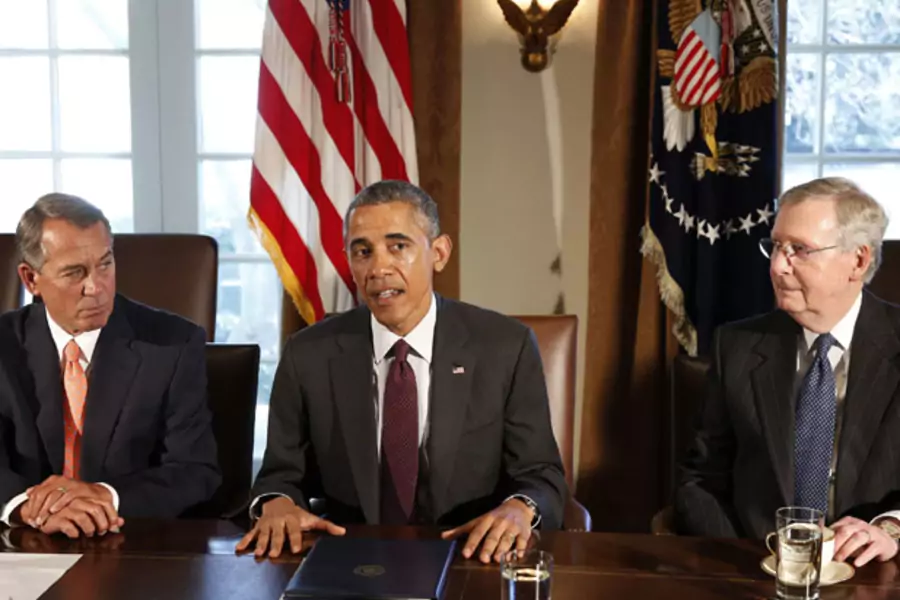The TPA Deal: A Big Step in the Right Direction

More on:
America’s politics have been broken for so long that it is rather shocking when things go right. But President Obama’s careful work across the aisles with the Republican congressional leadership to pass a new Trade Promotion Authority (TPA) bill this week shows that good governance is still possible.
The passage of TPA greatly strengthens the Obama administration’s foreign and economic policy position for its final 18 months. In Asia, it clears the way for a successful conclusion this year of the Trans-Pacific Partnership (TPP) with Japan and 10 other Asian countries. The TPP, while fairly modest in its economic impact, is the biggest U.S. trade agreement since the NAFTA with Mexico and Canada two decades ago. And it puts the United States in the lead in writing the rules for trade in the region, just as an increasingly assertive China is trying to take that role away. If Congress had failed to grant Trade Promotion Authority, the TPP talks at best would have limped along and at worst collapsed, severely weakening U.S. economic influence in the region.
No less important is Europe. As I wrote recently in Politico, the Transatlantic Trade and Investment Partnership (TTIP) with Europe gives the world’s two biggest markets a historic opportunity to set strong standards for trade and investment that could become global standards. But European leaders face every bit as much opposition as President Obama faced in pushing TPA through Congress; the European Parliament was recently forced by opponents to delay a crucial vote setting down its goals for the talks. The failure of TPA in the United States would likely have made it impossible for Europe to stay on board.
Obama rightly deserves much of the credit for TPA’s passage. To push the bill through, he had to endure a revolt from his own party, including House Democratic leader Nancy Pelosi (D-CA). Faced with unprecedented pressure from organized labor--which is saying something--the Democrats pulled out every weapon at their disposal to try to defeat their own president, including voting against a program that provides income support and retraining for workers who lose their jobs to trade competition. Defying a friendly president on trade had worked once before for labor, when it defeated President Bill Clinton’s request for trade negotiating authority in 1997. But President Obama refused to bend in the face of labor’s scorched earth tactics, and managed to hold on to just enough Democrats to push the bill through both the House and Senate.
The GOP deserves as much credit as the president. They could have played the trade issue for political advantage, encouraging the internal divisions among Democrats and then blaming the president for TPA’s failure. Instead Senate leader Mitch McConnell (R-KY) worked tirelessly with both sides to fashion a compromise that could gain the necessary 60 votes. He did it well enough that the last-minute reversal by Senator Ted Cruz (R-TX)--making a characteristically cynical effort to pander to far-right opposition to “Obamatrade”--only proved how thankfully irrelevant Mr. Cruz has become. House Speaker John Boehner (R-OH) and Ways & Means Committee chairman Paul Ryan (R-WI) similarly handled the issue masterfully in the House to make an end run around Democratic opponents. Hopefully the Republicans will learn from Obama's example when it comes to other issues. If Speaker Boehner had shown the same courage in standing up to his Tea Party wing on immigration -- an issue that divides the GOP the same way trade divides the Democrats – the Congress would have passed a historic immigration reform bill last year.
There is still a long road ahead on trade. The final stage of the TPP negotiations will be the hardest, with tough issues still to be resolved on agriculture with Japan, labor standards with Vietnam, poultry and dairy imports with Canada, and how fast the United States is willing to cut tariffs on cars and SUVs. The politics of trade remains a mess in the Democratic Party. Presumptive nominee Hillary Clinton--an enthusiastic supporter of the TPP when she was Secretary of State--has backed away and taken an equivocal stance to avoid alienating her union supporters. But labor’s embarrassing defeat on TPA, one can hope, might finally force the unions to find a more sensible middle ground in which they work with the Democrats to improve trade deals rather than trying to use their political muscle to defeat them.
Several years ago, Australia’s then foreign minister Bob Carr pushed back again the narrative that has become so common in Asia--that the United States is a declining power unable to rise above its own political divisions. Nonsense, Carr argued: “America is just one budget deal away from ending all talk of being in decline.” That budget deal may still be elusive, but the deal on trade is a huge step in the right direction.
More on:
 Online Store
Online Store